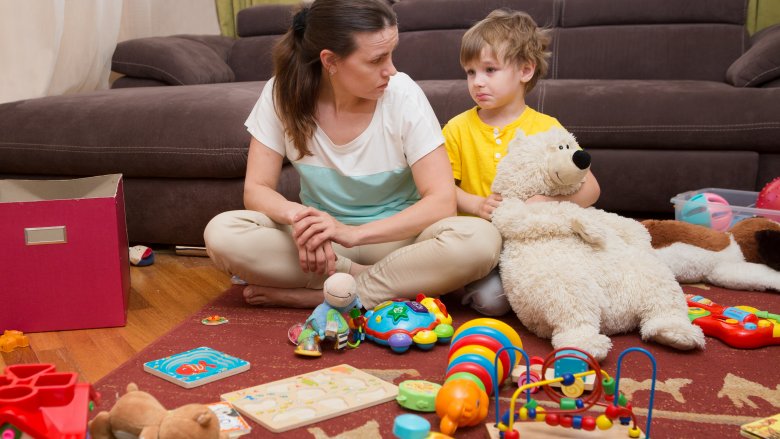Things You Should Never Say To A Friend Who Is Trying To Conceive
When a couple is trying to conceive, they are often very frustrated and stressed. As Dr. Vasiliki Moragianni, board certified OBGYN and reproductive endocrinologist with CCRM Northern Virginia, told me, "Trying to conceive, especially when dealing with infertility, can be one of the most stressful times in a person's life."
You may want to ask lots of questions, but often, what you say will end up doing more harm than good. What shouldn't you say to a friend who is trying to conceive? I went to the experts to find out.
Are you pregnant yet?
Your friend really wants to get pregnant. That's likely why she told you that she's trying. But asking her about it will just add to her stress. If she is pregnant, she may not be ready to tell anyone. If she's not pregnant, you'll just remind her that she hasn't been able to conceive yet.
Dr. Katrina Mark, an OB-GYN at University of Maryland Medical Center and Assistant Professor of Obstetrics, Gynecology and Reproductive Sciences at the University of Maryland School of Medicine, told me, "Don't ever ask a woman when she's going to have a baby."
She continued, "For someone who is going through fertility treatment, being constantly asked when they're going to have a baby can be devastating. You don't know what someone may be going through."
How long have you been trying?
Avoid asking probing questions about how long a woman has been trying to conceive. If your friend has been attempting to get pregnant for a long time, she's probably frustrated and upset. Reminding her of that isn't kind or compassionate.
Kimberly Hershenson, LMSW told me, "Women are often embarrassed or feel shame about how long they have been trying because they feel their womanhood is being questioned." Dr. Alice Domar, PhD, and creator/founder of The Domar Center for mind and body health at Boston IVF, added, "This is insensitive because no one is more aware of how long this is taking than the person trying to conceive. Every month feels like forever."
Just adopt instead
Even though adoption is a viable option for many couples, if your friend is trying to conceive, she probably wants to give birth to her own biological child. Assuming that adoption is an equally good option is uncaring.
Dr. Wendy Chang, F.A.C.O.G and fertility specialist with the Southern California Reproductive Center told me that you should never say "You should adopt" or "there are so many babies in the world who need good families." She explained: "While this statement is true, this may not be your friend's dream, now."
Also, adoption isn't easy. Many couples may not be able to adopt, even if they want to. Dr. Moragianni told me in our interview, "There are multiple barriers to treatment or adoption, including financial, ethical, social, etc. Try not to assume that all options are available to everyone."
If you think adopting will relieve the pressure on your friend and she'll be more likely to conceive, think again. Dr. Domar told me, "This is based on an old wives tale, that adoption always leads to conception, which implies that it is solely stress which is causing the infertility. In fact, most cases of infertility have a clear physical reason. Adoption doesn't clear blocked fallopian tubes, or cure endometriosis, or make abnormal testes produce sperm."
Relax and it will happen
Telling a friend not to feel the way they feel is a great way to get them to shut down and stop reaching out to you. Hershenson put it this way: "Telling someone not to worry is disrespectful because they are worried! Instead tell them you are available for support."
You may have heard that stress makes it more difficult to conceive, but telling a friend that they should relax won't actually help them relax — it will just show them that you don't value their feelings. Dr. Chang told me, "Infertility is a true medical diagnosis with many possible contributing factors that can require a variety of treatment options. Simply telling a friend to relax may cause them to feel unsupported, or to blame for being too stressed."
Merrie Haskins, MS, LPCC counselor and psychotherapist at MorningStar Counseling told me, "If you know that she is struggling in some way with conceiving, there is a lot going on under the surface. She is likely not sharing much of her ambiguous frustration, heartache and confusion."
But you look so young!
While fertility does decline when you age, couples can struggle to conceive at any age. Telling someone they should be able to conceive because they are young is unhelpful and ignores the real issues many couples face.
You could also discourage them from getting the fertility evaluation they need. Dr. Chang told me, "Women vary tremendously in their ovarian reserve and fertility obstacles. Simply being young is no guarantee for future success. If you discourage someone from seeking evaluation, they may feel resentful if they turn out to have a real concern."
Dr. Moragianni added, "Even though age is a very important determinant of reproductive potential, it is certainly not the only one. Women and men in their 20s and 30s can struggle with infertility, for a variety of reasons." No matter how young or old your friend is, she needs your support, not your judgment.
Maybe it's for the best
Telling your friend that it's for the best that she can't conceive will diminish her feelings and show her that you aren't on her side.
Dr. Chang put it like this: "Having a child is, for many people, an unspoken biological imperative. Telling a friend that maybe it's for the best (even if you are well-intentioned) may seem to minimize their pain and you may appear to completely overlook their struggle."
Don't underestimate the strong feelings your friend is experiencing. Dr. Moragianni told me, "Studies have found that individuals dealing with infertility can be as stressed and/or depressed as someone who was just diagnosed with cancer. Try to be empathetic, because to that person at that moment, this could not be any worse."
Maybe you're not meant to be parents
You may think that saying something like "maybe it's not meant to be" will make your friend see the bigger picture, but it will only make her feel even more inadequate.
Gail Sexton Anderson, EdM, CEO and founder of Donor Concierge, told me, "If you think this is helpful, and will relieve your friends stress, think again. You have just passed judgment on your friend to make them feel that they have missed the blessings of the universe or that somehow they might not be suited to be a parent."
Dr. Moragianni added, "It is not your responsibility to determine who can or cannot become a great parent. And after all, what is the definition of a good parent? Staying positive is a really important part of the oftentimes long journey that lies ahead for someone dealing with infertility."
Whose fault is it?
You may want to know if the woman or the man is the one who is struggling with infertility, but often, it's just taking a while for your friend to get pregnant. Dr. Mark told me, "Sometimes there's a reason for infertility — and sometimes, there's not. About 20 percent of the time, we find no reason for it."
Also, placing blame is unfair, as infertility is not a choice. As Dr. Domar put it, "Infertility is a disease, as classified by the WHO, and asking about fault suggests that someone did something to cause their infertility."
Pregnancy/having kids is hard
While pregnancy and having kids aren't easy, the last thing your friend wants to hear is how hard they can be. You may think you're telling her that she's better off without getting pregnant or having kids, but she has likely considered the difficult aspects of both already and still wants to conceive.
Hershenson suggested you focus on the positives, instead. She told me, "Telling them about the negatives of pregnancy is hurtful. Someone trying to conceive only dreams of experiencing pregnancy. Instead, share about the positive aspects of pregnancy."
Anderson added that you shouldn't tell your friend, "'Take my kids for a week and you'll change your mind.' This may have been said to be funny but it's not funny if your friend who has kids doesn't seem to appreciate what you have fought hard to have and which is just outside your grasp."
Have you tried…?
You may want to help your friend by commenting on her lifestyle or giving her advice. However, what she really needs is someone to be there for her unconditionally. Haskins suggested, "Don't criticize the way she is living her life or her timing. Don't blame her lifestyle or health. These make her feel judged. If you want to support her, and she is trying to make an effort to exercise or eat a certain way, you can be more supportive by joining her in the effort she's already doing or wanting to do."
She added, "Don't offer unsolicited advice. Don't ask probing questions.... Sometimes advice seems like blaming, that she can do something differently. If she seeks out some advice or a tip or a recommendation of a resource, that is different."
Anderson agreed. She added, "If it were that easy, your friend would already be pregnant. If your friend has shared his or her struggle to have kids, you are only seeing the tip of the iceberg. They have probably been trying everything possible, long before they let you in on their struggle."
How to be supportive instead
Now you know what you shouldn't say to your friend. You're probably wondering what you should say and do to be supportive. Here are some of the best recommendations.
Dr. Chang suggested, "Remember them on Mother's or Father's Day with a note or message of encouragement. Don't tiptoe around those holidays, but let your friend know you are rooting for them." She added, "Offer to accompany or drive them to doctor's visits and procedures. This will go a long way to letting them know they are loved and supported."
Dr. Mark added that even though it may be difficult to say the right thing, "If someone close to you is going through fertility issues, don't ignore it or become distant." Instead, she suggested, "Be a friend, act normal and open yourself up to the person for conversation if he or she wants to talk. A lot of times people want to talk about it but don't know how."











